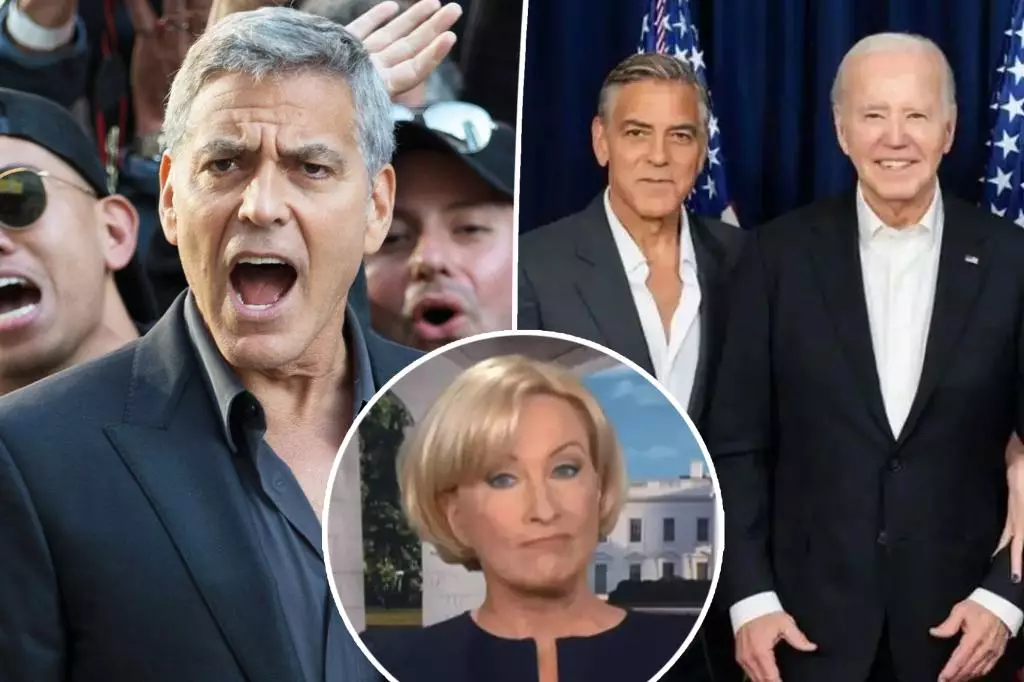The volatile intersection of celebrity and political discourse has been notoriously fraught, and the recent explosive encounter between George Clooney and Mika Brzezinski has reignited discussions about the responsibilities of public figures in political dialogue. Screenwriter Chris Whipple’s new book, *Uncharted: How Trump Beat Biden, Harris and the Odds in the Wildest Campaign in History*, highlights a surprising fallout where Clooney, the beloved Hollywood actor, allegedly lost his temper on an MSNBC producer over an insinuation made on “Morning Joe.” The direct implications of Brzezinski’s comments, suggesting a possible linkage between Clooney’s recent op-ed and former President Barack Obama, left the actor feeling not just offended, but also betrayed.
Clooney has long maintained a prominent role in political discussions, often championing causes that align with progressive values. However, as the details emerge, one must wonder: at what point does the actor’s advocacy become muddled in political maneuvering? When Brzezinski lightly suggested on air that Obama may have orchestrated Clooney’s editorial move, it caused ripples that revealed not only Clooney’s frustration but also an unsettling reality about the media’s role in shaping narratives about celebrity involvement in politics.
The Emotional Fallout
The emotional stakes, as Whipple describes, were apparently high. Clooney purportedly erupted during a phone call, demanding that his friend—an MSNBC producer—defend him against Brzezinski’s insinuation. The use of expletives in their conversation illustrates not only Clooney’s indignation but also highlights an essential truth: even friendships can fray when personal integrity and public perception clash. Clooney initially reached out in a fit of rage, indicating how personal the issue had become for him.
Yet, one must question whether Clooney’s response was truly justified. Is it appropriate for a celebrity—often under public scrutiny—to demand loyalty from friends in media positions? The journalist’s perspective captured in Tara Palmeri’s newsletter suggests a refreshing pushback against the usual deference afforded to A-list celebrities. Clooney’s demands for defense against what he perceived as an attack could be seen as an overreach, leading us into a complex negotiation of public relations and personal ethics.
The Evolution of Political Discourse
This incident raises significant questions regarding the climate of political commentary in America. Clooney’s immediate anger over Brzezinski’s comments illustrates how tight-knit celebrity networks can inadvertently complicate political conversations, blurring the lines between friendship and professional conduct. In an age rife with divisive opinions, it becomes crucial to understand that discourse surrounding political figures extends beyond mere commentary.
In a strange twist, the producer responded to Clooney’s ire with an indifference that added depth to the narrative. His words, “Nobody gives a [f–k] if we say if [Biden] should get out or if he should stay in,” deliberately undermined the perceived weight of celebrity statements in the political landscape. This retort not only defended the integrity of the show’s format but also highlighted the often ephemeral nature of “news” within the sensationalist media landscape. It’s a stark reminder that the attention given to high-profile editorial pieces often fades as quickly as the messages themselves.
The Broader Implications for Media and Democracy
The escalating tensions between Clooney and the media landscape embody a modern challenge: as political discourse becomes more polarized, individuals in influential positions must navigate their roles with care. Clooney’s fierce response underscores the difficulty public figures face when they are viewed as spokespersons for broader political themes. The personal and political are inseparable, and the risks of such entanglement manifest themselves through incidents like this one.
Furthermore, the producer’s willingness to push back against Clooney speaks volumes about the evolving dynamics of media power. In an era where celebrity opinions can sway public sentiment, the relationship between the media and its guests is under constant reevaluation. Far from merely playing the role of passive observers, media figures are becoming active participants in the shaping of political narratives, sometimes finding themselves at odds with those they commend.
In essence, this unfolding drama emphasizes the need for both celebrities and media professionals to maintain a delicate balance between their public roles and private sentiments. It’s a complex dance where the stakes—influence, reputation, and friendship—can easily lead to missteps that echo far beyond the original conflict.

